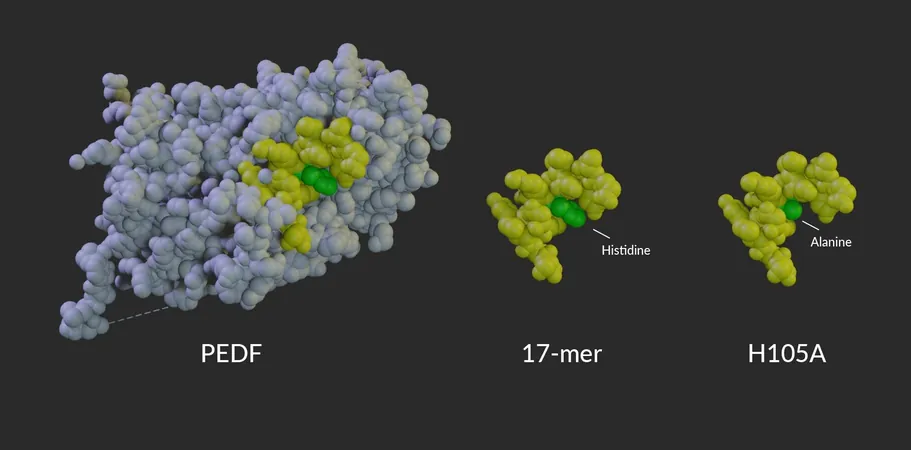
Revolutionary Eye Drops Derived from Natural Protein Show Promise in Slowing Vision Loss in Animal Studies!
2025-03-21
Author: Yu
In a groundbreaking development, researchers at the National Institutes of Health (NIH) have unveiled eye drops that show remarkable potential in delaying vision loss caused by inherited conditions like retinitis pigmentosa. This group of progressive retinal diseases leads to significant visual impairment, and the new treatment could offer hope for many individuals affected.
The innovative eye drops are formulated with a fragment of a naturally occurring protein known as pigment epithelium-derived factor (PEDF), which is crucial for maintaining the health of retinal cells. A detailed report of this study is published in the esteemed journal Communications Medicine.
Dr. Patricia Becerra, head of the Section on Protein Structure and Function at NIH's National Eye Institute and the senior author of the study, emphasized the significance of their findings: “While this isn’t a cure, the study strongly indicates that PEDF-based eye drops can slow the progression of various degenerative retinal diseases in animal models, including retinitis pigmentosa and dry age-related macular degeneration (AMD). We are thrilled to move forward with trials in human subjects.”
A commonality among all degenerative retinal conditions is cellular stress that leads to the gradual decline of retinal cells. Mutations and genetic variations linked to retinitis pigmentosa and AMD result in heightened stress levels, ultimately causing photoreceptor cells to malfunction and perish. This degenerative pathway can culminate in severe vision impairment and even blindness.
The research team previously discovered that the full-size PEDF protein is too bulky to penetrate the outer layers of the eye, which limits its therapeutic application despite its beneficial effects on retinal cells. Thus, to surmount this challenge, Dr. Becerra and her team engineered a series of short peptides derived from the functional regions of the PEDF protein. These smaller molecules can easily navigate through ocular tissues and attach to the PEDF receptor proteins located on the retina’s surface.
In their latest investigation, which was led by first author Alexandra Bernardo-Colón, the researchers produced two eye drop formulations containing these peptides. The first, known as “17-mer,” comprises 17 amino acids from the active site of PEDF. The second peptide, named H105A, boasts a stronger binding affinity to the PEDF receptor.
When applied to specially bred mice susceptible to retinal degeneration, the H105A peptide demonstrated significant therapeutic effects. Mice treated with the eye drops once daily exhibited a notable reduction in photoreceptor loss, preserving up to 75% of these important cells over a critical one-week period. In contrast, untreated mice suffered a severe decline in photoreceptor numbers and functional vision.
“This is an exciting milestone as it demonstrates that these short peptide eye drops can effectively reach the retina and provide a therapeutic benefit,” said Bernardo-Colón. "The treated mice displayed much healthier retinas with no adverse effects."
As research progresses, various gene therapies targeting different forms of retinitis pigmentosa are being developed. These novel PEDF-derived eye drops could serve as a vital interim treatment, sustaining retinal cell health while waiting for gene therapies to reach clinical availability.
In a pivotal follow-up study, collaborators Dr. Valeria Marigo and Dr. Andrea Bighinati from the University of Modena, Italy, administered gene therapy to the mice after the peptide treatment. Remarkably, this approach led to vision preservation that lasted at least six additional months, demonstrating the potential for combining treatments.
To further gauge the eye drops' effectiveness in humans, researchers partnered with Dr. Natalia Vergara from the University of Colorado Anschutz, to analyze the peptides on a human retinal tissue model. In the laboratory, the retina-like tissues exposed to stressed conditions demonstrated resilience and viability when treated with the peptides, highlighting their potential therapeutic role.
These promising findings pave the way for human clinical trials, igniting hope for innovative treatments leading to better vision preservation for those battling degenerative retinal diseases. The advancements in this area could revolutionize care for millions and transform the future of ophthalmic therapies!




 Brasil (PT)
Brasil (PT)
 Canada (EN)
Canada (EN)
 Chile (ES)
Chile (ES)
 Česko (CS)
Česko (CS)
 대한민국 (KO)
대한민국 (KO)
 España (ES)
España (ES)
 France (FR)
France (FR)
 Hong Kong (EN)
Hong Kong (EN)
 Italia (IT)
Italia (IT)
 日本 (JA)
日本 (JA)
 Magyarország (HU)
Magyarország (HU)
 Norge (NO)
Norge (NO)
 Polska (PL)
Polska (PL)
 Schweiz (DE)
Schweiz (DE)
 Singapore (EN)
Singapore (EN)
 Sverige (SV)
Sverige (SV)
 Suomi (FI)
Suomi (FI)
 Türkiye (TR)
Türkiye (TR)
 الإمارات العربية المتحدة (AR)
الإمارات العربية المتحدة (AR)